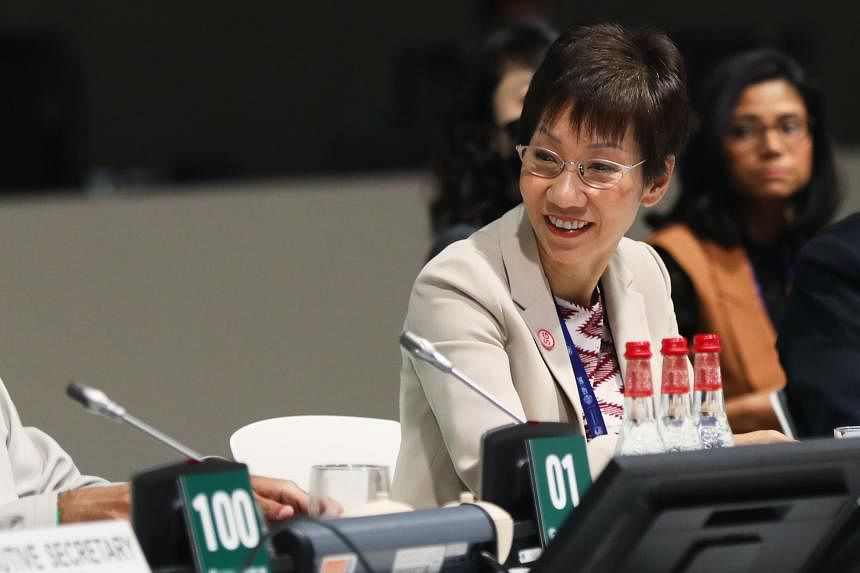DUBAI – With Week 2 of climate negotiations under way at the COP28 climate summit, environment ministers from all around the world are now at trying to hammer out a decision that all countries are satisfied with.
The Straits Times speaks to Singapore’s Minister for Sustainability and the Environment Grace Fu, who is co-facilitating negotiations on mitigation – a key prong of the Paris Agreement that entails whittling down global greenhouse gas emissions to limit warming to 1.5 deg C.
Here are snippets from the interview.
Q: How would you describe the atmosphere at COP28?
A: Very optimistic, very positive. Right from the get-go, there’s been a lot of momentum, and I’m feeling that now in the air. I’m also very realistic, because I’ve been through two COPs, and I understand the kind of obstacles ahead of us to really forge consensus. And COP requires a unanimous agreement to be reached, so it’s important for us not to lose momentum and optimism and reach a good landing point.
Q: Negotiators held the fort during Week 1, and then it’s over to the ministers. What now?
A: Negotiators basically resolve all the technical issues, definitions, how to scope the negotiation text. But when it comes to certain decisions like making trade-offs, that has to be done by the ministers, because we are the ones who have the political mandate of the people.
Q: You are co-facilitating discussions on mitigation this year. How is that going?
A: I think we will have an outcome, as in, I don’t think anybody wants to see a failed COP. But how ambitious the mitigation goals are? I feel the energy in the air, but I think we have to be realistic about the amount of tasks ahead of us.
Q: This is your third time co-facilitating negotiations with Norway’s Foreign Minister Espen Barth Eide. Could you describe your working relationship?
A: We basically hit it off quite well during the Article 6 negotiations on carbon markets, which began in Glasgow 2021. It was a very complex set of negotiations because the issues are very technical, and it’s also multi-faceted. There’s some commonality: Both of us came into the process rather late, and also we were quite novice when it came to Article 6. So when you’re in that position, you have each other to lean on, you’re not afraid to ask each other stupid questions, so to speak. There’s no ego, there’s no pretense.
So I think that kind of working relationship has worked well. I think that there’s also very good understanding, not just between me and Minister Espen, but between the Singapore team and the Norwegian team. Both of us are very aligned, very dedicated to the profession. So I think that helped.
Q:Singapore is known to have a bridging role between countries. What is the Singaporean way of negotiating?
A: Well, we are an honest broker, which means we don’t play games and we are what we are. For Singapore, our positions have been very consistent, so people know where we come from. They appreciate that, and they know that we will do a very good job in representing their views. It’s not just something that we developed overnight, but it’s really decades of building trust and credibility... I would like to thank all our diplomats and all our officers who have toiled for a really long time to establish our credibility internationally.
Q: What are three things that people will be surprised to learn about COP?
A: Negotiations are behind closed doors, so most of the time you don’t see them going on. No. 2, it is very important for us to be clued in to the different groups, because negotiations are done in groupings. This means we need to start deciding on “group positions” very early on in the negotiation process.
Singapore is part of a negotiation group known as the Alliance of Small States, which includes many Pacific island states. Some examples of the other negotiation groups are the European Union, the G77 and China, as well as the least developed countries.
No. 3, there’s this thing about dressing right (for COP). Today I’m in batik, and it’s to remind people about South-east Asian heritage. Sometimes (other delegates) might mistake Singapore for different ethnic groups, and so on. So, it’s important for us to show that South-east Asians are represented, Asians are represented, and Singapore is also represented.
Q: How does Singapore balance its national interests and its role as a co-facilitator for negotiations?
A: That’s a trade secret. We have to do it quite carefully, so people know that we are not compromising our co-facilitators role with our national interests. But of course, I’m here to also protect Singapore’s interests, so I have to do this balancing work quite carefully.
Q: What’s one thing you look forward to at COP?
A: A good mandate, a good decision, but also as what the COP28 president said, we’re looking at a paradigm shift from turning agreements into action. I think that’s quite important for Singapore. We have set our nationally determined contributions (NDCs, or national climate targets) and we want to see the implementation of all NDCs so that we can all move together globally and collectively.


